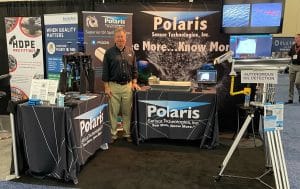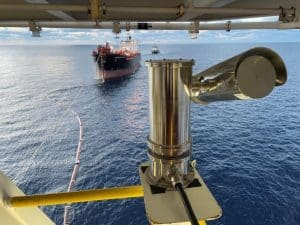Polaris Sensor Technologies

Founded in 2003, Polaris Sensor Technologies, Inc., a woman-owned business, is a leading electro-optic sensor company developing advanced optical systems for applications ranging from military sensors for detection, tracking, and environmental monitoring to navigation, holography, and hypersonic aero-optics. With a variety of customers across the DoD, we develop novel imaging sensors in wavebands from the visible to the infrared. Starting with only scientific concepts, we have delivered highly specialized sensors funded by the military that have evolved into laboratory instruments as well as small, rugged prototype systems suitable for surveillance, targeting, tracking, environmental monitoring, and inspection. Advanced algorithms and calibration software enable the systems to operate beyond the performance of traditional cameras. Today, the applied research investment exceeds twenty-five million dollars, and our products are being field tested and readied for the commercial market.
 We have a range of expertise that spans a wide breath of technologies. For example, we are specialists in the exploitation of polarization, a fundamental attribute of light that reveals details undetected by other imaging devices. Our polarization imagers solve difficult detection and imaging issues for military and commercial applications, and they augment traditional sensors and algorithms for target detection and tracking, chemical detection on water, clutter suppression for ground and air targets, navigation, and even facial recognition. We are recognized experts in hypersonic aero-optic effects and support the nation’s hypersonic wind tunnel and ground test facilities. We develop custom optics, electronics and chemistry to meet our customers missions.
We have a range of expertise that spans a wide breath of technologies. For example, we are specialists in the exploitation of polarization, a fundamental attribute of light that reveals details undetected by other imaging devices. Our polarization imagers solve difficult detection and imaging issues for military and commercial applications, and they augment traditional sensors and algorithms for target detection and tracking, chemical detection on water, clutter suppression for ground and air targets, navigation, and even facial recognition. We are recognized experts in hypersonic aero-optic effects and support the nation’s hypersonic wind tunnel and ground test facilities. We develop custom optics, electronics and chemistry to meet our customers missions.
Polaris Sensor Technologies began with a few Small Business Innovative Research (SBIR) Grants and four employees. We have remained a small, agile research group and are approaching 40 employees. We are a prime contractor and support the National Laboratories, and many large and small businesses alike. The company founders worked in high technology research and development groups in Huntsville Alabama, when their former employer was sold to a large business, they collected the talent from the local research and development labs and the University of Alabama in Huntsville to establish a research-oriented company that focused on hardware and software to solve very difficult problems.
The time it takes to invent, to bridge the technical gap, is a long-standing problem. Keeping teams together between project phases is difficult. The long contracting time between awards and phases remains the most significant challenge. Our team accepts large and small scopes of work and discovering how to balance many customer missions in a wide range of technologies takes expertise, talent and patience.
The UAH incubator program enabled our team to leverage low overhead costs for a number of years while we developed the hardware and infrastructure to launch this research and development business. We developed a savvy group of high value talent who performed engineering service support for hypersonic interceptors and novel optical system prototypes. The key component that helped us grow was hiring talent from laboratories around the nation to develop novel systems, then using these systems to aid customers.
Growth is essential to keep up with the cost of running our business and expanding the talent base to meet our customer demands. We continue to develop technology in multiple markets to ensure the stability of the company. We are a multidimensional company. Pursuing international sales is a key factor in our growth strategy. We are targeting customers in Europe, the UK, Australia, Spain, Canada, and most NATO countries. And we have successfully exported to Finland, Australia, the UK, Spain, and Canada. Export opportunities have been fueled by commodity jurisdictions that have moved our sensors and technology from the Department of State to the Department of Commerce. We have an in-house legal team striving to pull technology into commercial markets.
Being a woman in an engineering business has offered little advantage. Most women owned businesses are not as highly technical. And contracting set asides are more common for low tech service industries. Being a woman in engineering leadership has come with the well-known and well established biases. Our staff includes a large percentage of talented women, nearly 30%. Michele Banish is the CEO and Co-Founder of Polaris Sensor Technologies. Mrs. Banish formed the company as a researcher, and leader of contracts focused on artificial intelligence and image processing. During her technical career, she has developed software, hardware, and optical systems to support hypersonic aero-optical system modeling, applied optics, and automated diagnoses using neural networks. She is developing novel chemistry for disinfection and sterilization for the US Army. She holds many patents. Michele developed the business infrastructure and processes that exist today for Polaris. And she spun out a subsidiary, KnowFlame®, around novel flame detection and biochemical technology to focus on the commercial technologies. Patents placed in this subsidiary have been licensed and sold to fund the development of new products. Prior to founding Polaris, Michele worked at firms that focused on micro machine manufacturing and patented anti-reflective surface structures for next generation focal planes. She received her B.S. in Electrical Engineering in 1987 with a minor in Engineering Management and her M.S. in Electrical Engineering from the University of Alabama in Huntsville in 1994.
Michele Banish mentors women engineers at the University of Alabama in Huntsville. The company has developed tools for other small businesses and counseled them to success. The company is charitable, supporting the organizations associated with its employees. The local community has few small businesses developing high technology hardware and software. Michele speaks at SBA conferences regularly to encourage other new small businesses and share lessons learned. David Chenault is a Co founder and has long held a national position in the Society of Photo Instrumentation Engineers to provide technical exchange in our area of expertise.
Polaris was referred to the AITC by Redstone Government Consulting. The Alabama International Trade Center and the Alabama SBDC have worked with Polaris Sensor Technologies since 2020 providing a variety of services and expertise. AITC team members conducted market research to identify new potential export markets, provided in-house export training on a variety of export-related topics, identified, and vetted potential foreign distributors, and aided in the formulation of export market entry strategies. Additional assistance was supplied in relation to classifications, international contracts, and Export Compliance under ITAR and EAR. And the AITC staff helped connect Polaris to industry contacts in the Nordic region. The AITC is a member of the Alabama SBDC Network, a SBA resource partner. Polaris Sensor Technologies has made full use of the Export Alabama Alliance by working with agencies including the Alabama Department of Commerce and the US Commercial Service. Mrs. Banish commented on the assistance received from the AITC: “The highly technical staff leveraged AITC to do global market research and develop methods to reach customers worldwide. The AITC enabled the team to develop and evaluate opportunities more effectively.”
Polaris used the PPP Loan to hire, fund young staff members and to develop new technology during the pandemic. The disinfecting chemistry being brought to the market today is an outcome of the PPP investment research and development.
Polaris offers a full health care package free of cost to the employees, and funds the employee 401k retirement plan deposits.
